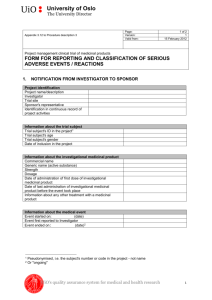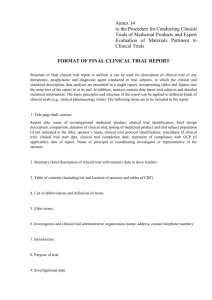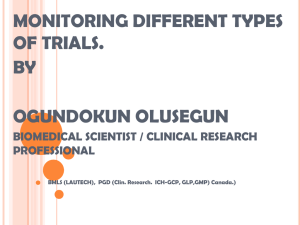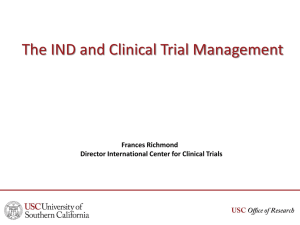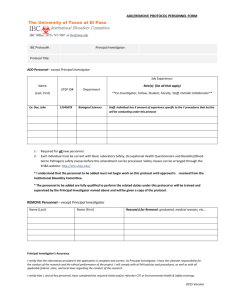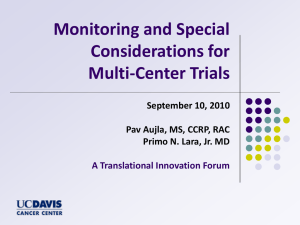UoB-CLN-CTM-QCD-001 Glossary of Terms v2.0
advertisement
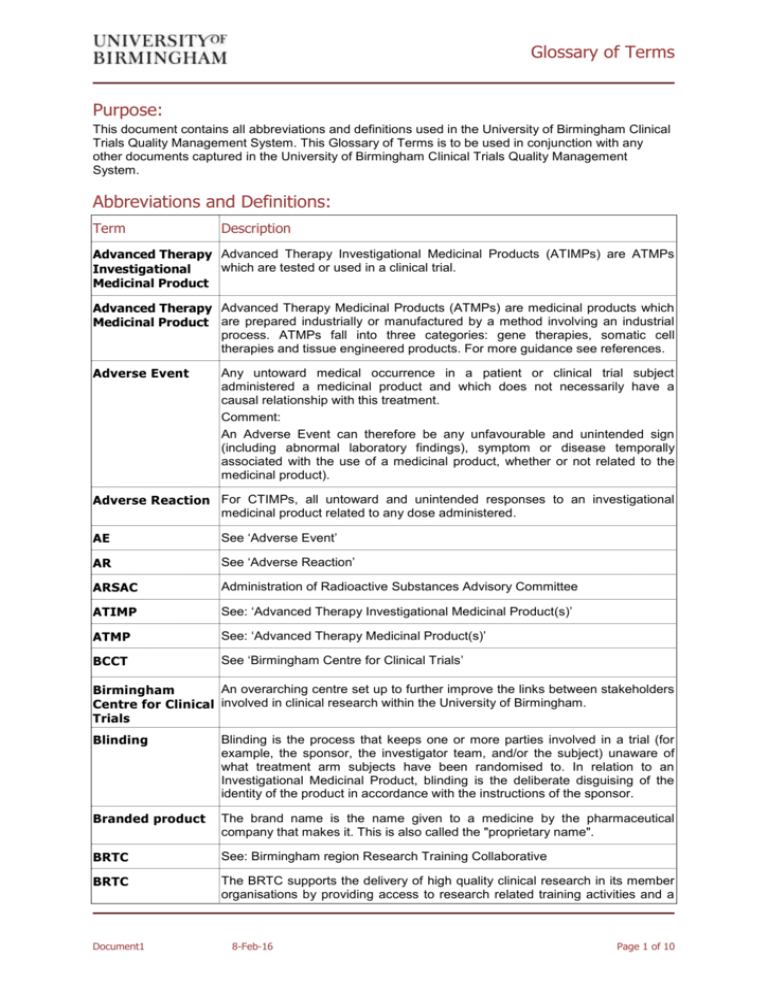
Glossary of Terms Purpose: This document contains all abbreviations and definitions used in the University of Birmingham Clinical Trials Quality Management System. This Glossary of Terms is to be used in conjunction with any other documents captured in the University of Birmingham Clinical Trials Quality Management System. Abbreviations and Definitions: Term Description Advanced Therapy Advanced Therapy Investigational Medicinal Products (ATIMPs) are ATMPs which are tested or used in a clinical trial. Investigational Medicinal Product Advanced Therapy Advanced Therapy Medicinal Products (ATMPs) are medicinal products which Medicinal Product are prepared industrially or manufactured by a method involving an industrial process. ATMPs fall into three categories: gene therapies, somatic cell therapies and tissue engineered products. For more guidance see references. Adverse Event Any untoward medical occurrence in a patient or clinical trial subject administered a medicinal product and which does not necessarily have a causal relationship with this treatment. Comment: An Adverse Event can therefore be any unfavourable and unintended sign (including abnormal laboratory findings), symptom or disease temporally associated with the use of a medicinal product, whether or not related to the medicinal product). Adverse Reaction For CTIMPs, all untoward and unintended responses to an investigational medicinal product related to any dose administered. AE See ‘Adverse Event’ AR See ‘Adverse Reaction’ ARSAC Administration of Radioactive Substances Advisory Committee ATIMP See: ‘Advanced Therapy Investigational Medicinal Product(s)’ ATMP See: ‘Advanced Therapy Medicinal Product(s)’ BCCT See ‘Birmingham Centre for Clinical Trials’ An overarching centre set up to further improve the links between stakeholders Birmingham Centre for Clinical involved in clinical research within the University of Birmingham. Trials Blinding Blinding is the process that keeps one or more parties involved in a trial (for example, the sponsor, the investigator team, and/or the subject) unaware of what treatment arm subjects have been randomised to. In relation to an Investigational Medicinal Product, blinding is the deliberate disguising of the identity of the product in accordance with the instructions of the sponsor. Branded product The brand name is the name given to a medicine by the pharmaceutical company that makes it. This is also called the "proprietary name". BRTC See: Birmingham region Research Training Collaborative BRTC The BRTC supports the delivery of high quality clinical research in its member organisations by providing access to research related training activities and a Document1 8-Feb-16 Page 1 of 10 Glossary of Terms communication forum whereby learning resources and local events can be shared. CA Competent Authority Case Report Form A printed, optical, or electronic document designed to record all of the protocol required information to be reported to the sponsor on each trial subject. Chief Investigator The person who takes overall responsibility for the design, conduct and reporting of a study if it is at one site; or if the study involves researchers at more than one site, the person who takes primary responsibility for the design, conduct and reporting of the study, whether or not that person is an investigator at any particular site. Note that for CTIMPs the Chief Investigator must be an authorised health professional. CI See ‘Chief Investigator’ Clinical research Any health related research on humans. Clinical Research The Clinical Research Compliance Team (CRCT) forms part of the College of Compliance Team Medical and Dental Sciences Research and Knowledge Transfer Office, and is responsible for developing an infrastructure for researchers involved in clinical studies. In addition, the team takes on responsibilities relating to Sponsor oversight such as audits and quality checks. Clinical study Any health related research study on humans. This includes: Study administering questionnaires/interviews for quantitative analysis, or using mixed quantitative/qualitative methodology Study involving qualitative methods only Study limited to working with human tissue samples (or other human biological samples) and data (specific project only) Study limited to working with data (specific project only) Clinical trial For clinical trials using an Investigational Medicinal Product: Any investigation in human subjects intended to discover or verify the clinical, pharmacological and/or other pharmacodynamic effects of one or more investigational medicinal product(s), and/or to identify any adverse reactions to one or more investigational medicinal product(s) and/or to study absorption, distribution, metabolism and excretion of one or more investigational medicinal product(s) with the object of ascertaining its (their) safety and/or efficacy. For all other clinical trials: Prospective biomedical research on human subjects that are conducted to allow safety (or more specifically, information about adverse drug reactions and adverse effects of other treatments) and efficacy data to be collected for health interventions. Examples include devices, surgery and radiotherapy trials. Clinical Trial Authorisation The regulatory approval for a clinical trial of an investigational medicinal product, issued by the MHRA Clinical Trials Oversight Committee The Clinical Trials Oversight Committee (CTOC) provides sponsor oversight of UoB’s portfolio of Clinical Trials of Investigational Medicinal Products (CTIMPs). The CTOC also provides a means for the Research Governance Team to obtain expert advice relating to non-CTIMPs. The CTOC reports to the Pro-Vice Chancellor for Research & Knowledge Transfer through the University Research Governance and Ethics Group, and to the University of Birmingham Internal Audit Office. Code Break Also known as breaking the blind. Is the mechanism that permits the rapid Document1 8-Feb-16 Page 2 of 10 Glossary of Terms identification of the trial treatment received by a subject in the case of a medical emergency, pre-specified protocol indication or safety reporting requirement, but does not permit undetectable breaks of the blinding. Coordinating Centre A term commonly used to refer to the team responsible for the overall management of the trial and their physical location. A Coordinating Centre may be based in a Clinical Trials Unit, and may also be referred to as a Trials Office. There may be more Coordinating Centres involved in a trial, e.g. for international trials the international and national Coordinating Centre, and for trials managed regionally the central and local Coordinating Centre. CRCT See: ‘Clinical Research Compliance Team’ CRF See: ‘Case Report Form’ CTA See ‘Clinical Trial Authorisation’ CTIMP A Clinical Trial of an Investigational Medicinal Product(s) CTOC See: ‘Clinical Trials Oversight Committee’ CTU Clinical Trials Unit CTU hosted study A study for which the CTU undertakes some individual tasks related to the conduct of the study, but for which the CTU has not been delegated the overall task of managing the entire study on behalf of the Sponsor. Examples, though not exhaustive, would be acting as or supporting the investigator site, and/or undertaking one or more individual tasks such as Monitoring, Pharmacovigilance, IMP Supply, Data Management, Statistics. Where the CTU undertakes such specific tasks, the CTU is responsible for ensuring those tasks are conducted as expected and in line with the relevant QMS. Where all or the majority of the functions listed above are being carried out, it may be appropriate to regard the study as CTU managed. CTU managed study A study for which the overall study management or the majority of study management duties has been delegated to the CTU on behalf of a Sponsor. Examples include all or most of the activities of Registration, Site Initiation, Monitoring, IMP supply, Pharmacovigilance, Data Management and Statistical Analysis. CTU manager Those staff members within a CTU who take on line management responsibilities for their staff, e.g. Team Leaders, Team Managers, and Senior Trial Coordinators. CTU member Any member of staff who is either line managed within the CTU, or who has been invited by the Director of the CTU to join the CTU (e.g. as member of the executive committee), under the understanding that in the case of any issues or non-compliance, the Director has a right of sanction. CTU mentorship For an Investigator managed study the investigator or team member may request a CTU for advice; this is considered as CTU mentorship. In this case the Investigator maintains responsible for ensuring the study is conducted appropriately. CV Curriculum Vitae DSUR Development Safety Update Report EEA European Economic Area Document1 8-Feb-16 Page 3 of 10 Glossary of Terms Employee Training Record Record of any training sessions that relate to previous and current functions and that are relevant for the current post ERN Ethics Registration Number; an internal number assigned to a project following completion of a UoB Ethical Review of Research Self Assessment Form Essential Documents Essential Documents are those documents which individually and collectively permit evaluation of the conduct of a trial and the quality of the data produced. These documents serve to demonstrate the compliance of the investigator, sponsor and monitor with standards of Good Clinical Practice and with all applicable regulatory requirements. Existing study For the purposes of UoB sponsor oversight, a study that has a minimum provisional sponsor approval. GCP Good Clinical Practice guidelines Good Clinical Practice A set of internationally recognised ethical and scientific quality requirements which must be observed for designing, conducting, recording and reporting clinical trials that involve the participation of human subjects. IB Investigator Brochure ICF See: ‘Informed Consent Form’ ICH International Conference on Harmonisation of Technical Requirements for Registration of Pharmaceuticals for Human Use; commonly referred to as ‘International Conference on Harmonisation’ ICH Countries Countries using the guidelines set up by the International Conference on Harmonisation of Technical Requirements for Registration of Pharmaceuticals for Human Use ICH GCP International Conference on Harmonisation Good Clinical Practice Guidelines; this is an international ethical and scientific quality standard for designing, conducting, recording and reporting trials that involve the participation of human subjects. ICH GCP is also referred to as ‘GCP’. IMP See: ‘Investigational Medicinal Product’ For the purpose of the UoB QMS, either a Principal Investigator for singleIndependent Chief Investigator centre studies, or a Chief Investigator for multicentre studies who manages their study(s) outside a UoB CTU. Informed Consent The Informed Consent Form is the form which is used to document the voluntary confirmation of a participant’s willingness to take part in a trial after Form having being informed of all aspects of the trial that are relevant to their decision. The form must be signed and dated. Interactive Voice Response System A phone technology that allows a computer to detect voice and touch tones using a normal phone call. IVRS can respond with pre-recorded information to further direct callers on how to proceed with regards to a clinical trial. Interactive Web Response System A Web technology that is designed to give adequate information for users to manage clinical trials. A pharmaceutical form of an active substance or placebo being tested or used Investigational Medicinal Product as a reference in a clinical trial, including products already with a marketing authorisation but used or assembled (formulated or packaged) in a way different from the authorised form, or when used for an unauthorised indication, or when used to gain further information about the authorised form Document1 8-Feb-16 Page 4 of 10 Glossary of Terms Investigator Brochure A document containing a summary of the clinical and non-clinical data relating to an investigational medicinal product which are relevant to the study of the product in human subjects. Investigator managed study A study for which the overall study management is under the responsibility of an independent Chief Investigator. Specific tasks may be delegated to a member of his/her team or to a CTU. IRAS Integrated Research Application System; set up to streamline the research application process in the UK IRMER The Ionising Radiation (Medical Exposure) Regulations 2000 ISF Investigator Site File IVRS See ‘Interactive Voice Response System’ IWRS See ‘Interactive Web Response System‘ LES College of Life and Environmental Sciences MA Marketing Authorisation MAH Marketing Authorisation Holder Manager A person within the UoB who takes on line management responsibilities. This is typically an academic related or support staff function. MDS College of Medical and Dental Sciences Mentorship Clinical Trials Unit (CTU) mentorship is defined as an informal and professional relationship between an Independent Chief Investigator and/or their research team and one of the three UKCRN registered UoB CTUs, whereby there is an informal transmission of clinical trial experience, knowledge, skills, information and perspective imparted from the UoB CTU to the Independent Chief Investigator and/or their research team. The UoB CTU will not act in a supervisory capacity and the ultimate responsibility for the conduct of a trial will lie with the Independent Chief Investigator. Where CTU mentorship is agreed upon, this will be documented. Where the UoB CTU feels their mentoring provision is ignored, leaving the Sponsor open to risks, they may choose to discuss this directly with the Sponsor. MHRA Medicines and Healthcare products Regulatory Agency; the Competent Authority in the UK MIA(IMP) Marketing and Importation Authorisation for IMPs NIHR National Institute for Health Research NIHR CRN National Institute for Health Research Clinical Research Network NIHR CSP NIHR Coordinated System for gaining NHS Permission Non-commercial Clinical trial In accordance with Directive 2001/20/EC, a non-commercial clinical trial is defined as a trial: □ Conducted by a non-commercial organisation, with no industry sponsor, that is not part of the development program for a marketing authorisation of a medicinal product; or, □ If potentially leading to a marketing application, where the holder of the intellectual property/patent is a not-for-profit organisation Non-CTIMP Any clinical trial which is not a CTIMP Document1 8-Feb-16 Page 5 of 10 Glossary of Terms Medicinal products supplied to subjects participating in a trial, used in Nonaccordance with the protocol, which do not fall under the definition of IMPs in Investigational Medicinal Product Directive 2001/20/EC. Examples include: Medicinal products used to minimise anticipated adverse reactions e.g. corticosteroids and/or antihistamines (NIMP) treatment given to reduce the risk of expected adverse reactions before the administration of a new antineoplastic agent (IMP) Medicinal products used as rescue medication e.g. opioid pain relief treatment (NIMP) given as a rescue medication when administration of a new IMP painkiller (IMP) is found not to give adequate pain relief Medicinal products used as challenge agents e.g. a skin prick test (NIMP) used to identify subjects with allergic responses for the inclusion/exclusion criteria for a clinical trial Medicines used to assess primary end-points in the clinical trial e.g. PET radiopharmaceuticals (NIMP) administered to a clinical trial population to measure organ function before and after the subject has been given an IMP whose effects in this organ are the primary end-point Concomitant medicinal products systematically prescribed to study patients e.g. Anti-cancer treatment (NIMP) in the trial of a new anti-sickness drug (IMP), where the objective of the trial is to assess the anti-sickness effect of the new drug by testing the new drug against the gold standard anti-sickness drug (NIMP) in patients treated with the same anti-cancer treatment (NIMP) Background treatment administered to each clinical trial subject in a study e.g. Adjuvant chemotherapy (NIMP) given to all patients in the development of a new indication for a licensed medicine (IMP) Detailed and useful examples of NIMPs can be found in the European Commission ‘Definition of Investigational Medicinal Products (IMPs). Definition of Non Investigational Medicinal Products’. Participant Information Sheet The Participant Information Sheet describes in layperson’s terms a research study, explaining its purposes and methods, and outlining the risks and benefits of participation. Information sheets are also referred to as ‘Patient Information Sheet’. PDR Performance and Development Review PF2 / PF3 Form Forms used by the Research Governance Team for request for Sponsorship PI See ‘Principal Investigator’ Pink Form College of Medical and Dental Sciences Application for Research Grants and Contracts Approval Form; this is a college specific form that facilitates the review, approval and tracking of any new grant proposals and that is commonly known as ‘Pink Form’. PIS See: ‘Participant Information Sheet’ Policies Policies are developed to describe the approach of the UoB on areas that are heavily regulated. Policies may also be developed when there is ambiguity in how regulatory requirements should be implemented in the QMS or when procedures to be captured in the QMS address areas controversial within the UoB at the time of implementation. Policies explain why the UoB has its procedures. Policies should be read in conjunction with the relevant SOP. Policies that are not part of a Quality Manual are coded up as ‘POL’. Principal Investigator The investigator is responsible for the conduct of a clinical trial at a trial site. If a trial is conducted by a team of individuals at a trial site, the investigator is the leader responsible for the team and may be called the Principal Investigator. Document1 8-Feb-16 Page 6 of 10 Glossary of Terms QCD See ‘Quality Control Document’ QMS See ‘Quality Management System’ QMS Archive File Folder(s) containing the archived hard copies of the superseded versions of QMS documents QMS Development Team of UoB staff members responsible for developing and maintaining either the UoB QMS or a QMS referring to the UoB QMS, e.g. Clinical Trials QMS. Team QMS Manager Individual responsible for developing and maintaining a QMS; this may be the UoB QMS or topic specific QMS such as Clinical Trials QMS. The individual may have another job title, and details will be captured in the relevant Quality Manual. QMS Master File Folder(s) containing the signed hard copies of the current versions of QMS documents QOL Quality of Life Qualified Person The Qualified Person is responsible for certifying that each batch of IMP has been manufactured and checked in compliance with the requirements of EU GMP, the product specification file and the CTA. Quality Control Documents Quality Control Documents can be instructions, forms, templates or checklists. They are developed to share best practices, promote standardisation to guarantee quality standards are maintained and reduce resources otherwise needed to develop similar documents. Unless indicated otherwise in the relevant SOP, QCDs are not mandatory and are designed to be an optional aid to UoB staff. Quality Management System A Quality Management System (QMS) is a system that includes procedures and policies to describe how certain tasks should be performed and that encapsulate any standards and/or regulatory requirements that may apply to those tasks. By adhering to the Quality Management System, the user and the UoB will be assured that applicable regulations are adhered to. R&KT Office Research and Knowledge Transfer Office RA1 Form Research Activation Form used by the Research Finance Office to document that an account has been set up and listing the account code. Randomisation The process of assigning trial subjects to treatment or control groups using an element of chance to determine the assignments in order to reduce bias. Randomisation Code A unique number or code that is linked via a randomisation list to the treatment. Randomisation Schedule A list of intervention groups, randomly ordered, used to assign sequentially enrolled participants to intervention groups. Also termed the "randomisation list". REC Research Ethics Committee Reference Safety Information Term used within EC Detailed Guidance (CT3) June 2011, meaning the applicable product information which is used to determine the expectedness of an Adverse Reaction. This information is normally obtained from within the Summary of Product Characteristics or Investigator Brochure; when referring to the Investigator Brochure the relevant section must be defined. It may be a separate document in its own right. It must be defined at the start of a trial. Research Ethics Team That part of the Research Governance and Ethics Team whose primary activity Document1 8-Feb-16 Page 7 of 10 Glossary of Terms is the management of the University’s research ethics review processes. Research Facilitator The Research Facilitator acts as the central contact point in project development, initiation and conduct. The Research Facilitator liaises with relevant contacts e.g. Finance Office, peer review and any other internal or external bodies which may be able to assist. Research Facilitators work closely with Head of School to ensure compliance with the UoB Code of Practice for research and other regulations especially with regard to more junior researchers or those working outside of a Clinical Trials Unit. Different Colleges may use different job titles for the same role. The Research Governance Team is part of the Research Governance and Research Governance Team Ethics Team and is responsible for Sponsorship decisions and confirmation of Sponsorship on behalf of the UoB, signing-off any applications for approval/authorisation as Sponsor representative, issuing trial specific template Site Agreements, and for maintaining Sponsor oversight. Research Support The Research Support Partner works closely together with the College’s Director of Research and Knowledge Transfer, contributing to the College’s Partner Research and Knowledge Transfer strategy and dealing with associated matters. The Research Support Partner is responsible for ensuring research in the College is supported by providing the first point of contact, both internally and externally, for advice and assistance with all research-related issues, by providing up to date information regarding research funding and by providing an essential interface with relevant corporate services. Different Colleges may use different job titles for the same role. RG Number Research Governance Number; the number that the Research Governance Team will assign to any project put forward for UoB Sponsorship RG&ET Research Governance and Ethics Team, consisting of the Research Governance Team and the Research Ethics Team. RGF Research Governance Framework RGT See: ‘Research Governance Team’ RSI See ‘Reference Safety Information’ RSI Term used within EC Detailed Guidance (CT3) June 2011, meaning the applicable product information which is used to determine the expectedness of an Adverse Reaction. This information is normally obtained from within the SPCs or IB; when referring to the IB the relevant section must be defined. It may be a separate document in its own right. It must be defined at the start of a trial. SAE Serious Adverse Event SAF UoB Ethical Review of Research Self Assessment Form SAR See: ‘Serious Adverse Reaction’ SDR Staff Development Review scheme SDV See ‘Source Data Verification’ Serious Adverse Event Any untoward medical occurrence or effect that at any dose: Document1 Results in death Is life-threatening* Requires hospitalisation hospitalisation 8-Feb-16 or prolongation of existing inpatients’ Page 8 of 10 Glossary of Terms Results in persistent or significant disability or incapacity Is a congenital anomaly/birth defect Or is otherwise considered medically significant by the Investigator** Comments: The term severe is often used to describe the intensity (severity) of a specific event. This is not the same as serious, which is based on participants/event outcome or action criteria. * Life threatening in the definition of an SAE refers to an event in which the participant was at risk of death at the time of the event; it does not refer to an event that hypothetically might have caused death if it were more severe. ** Medical judgment should be exercised in deciding whether an AE is serious in other situations. Important AEs that are not immediately life threatening or do not result in death or hospitalisation but may jeopardise the subject or may require intervention to prevent one of the other outcomes listed in the definition above, should be considered serious. Serious Adverse Reaction For CTIMPs, an adverse reaction which also meets the definition of a Serious Adverse Event. SmPC Summary of Product Characteristics SOP See: ‘Standard Operating Procedures’ Source Data Verification The process of checking the accuracy and completeness of CRF entries against the source data contained in source documents Sponsor Individual, organisation or group taking on responsibility for securing the arrangements to initiate, manage and finance a clinical study. Standard Operating Procedures Standard Operating Procedures are detailed written instructions to achieve uniformity in the performance of a specific function. They define tasks, allocate responsibilities, detail processes, indicate documents and templates to be used and cross-reference to other work instructions and guidance or policy documents. They are standards to which the UoB may be audited or inspected. SUSAR See: ‘Suspected Unexpected Serious Adverse Reaction’ Suspected Unexpected Serious Adverse Reaction For CTIMPs, A Serious Adverse Reaction that is unexpected i.e. the nature, or severity of the event is not consistent with the applicable product information. A SUSAR should meet the definition of an Adverse Reaction, an Unexpected Adverse Reaction and a Serious Adverse Reaction TMF Trial Master File. TMG Trial Management Group Trials Office A term commonly used to refer to the team responsible for the overall management of the trial, and their physical location. A Trials Office may be based in a Clinical Trials Unit, and may also be referred to as Coordinating Centre. TSC Trial Steering Committee UAR See ‘Unexpected Adverse Reaction’ UKCRC UK Clinical Research Collaboration UKCRN UK Clinical Research Network Unblinding Is the disclosure of the identity of blinded treatment. Document1 8-Feb-16 Page 9 of 10 Glossary of Terms For CTIMPs, an Adverse Reaction, the nature or severity of which is not Unexpected Adverse Reaction consistent with the applicable product information (e.g. investigator's brochure for an unauthorised investigational product or summary of product characteristics for an authorised product). Unexpected and Related Event For non-CTIMPs, an event which meets the definition of both an Unexpected Event and a Related Event. Unexpected Event For non-CTIMPs, the type of event that is not listed in the protocol as an expected occurrence. UoB University of Birmingham UoB CTU One of the three UKCRC fully registered University of Birmingham Clinical Trials Units, i.e. Cancer Research UK Clinical Trials Unit (CRCTU), Birmingham Clinical Trials Unit (BCTU) or the Primary Care Clinical Research and Trials Unit (PC-CRTU). UoB Lead The UoB Lead is a (senior) person in the UoB who takes responsibility for the conduct and delivery of those parts of the study which are either carried out at or managed/overseen by the UoB. Normally this would be an academic researcher, but in some cases it may be a senior member of a UKCRC registered UoB CTU. UoB Sponsored study A study for which the University of Birmingham acts as a Sponsor or CoSponsor. These studies may be either CTU managed or Investigator managed. Document1 8-Feb-16 Page 10 of 10
